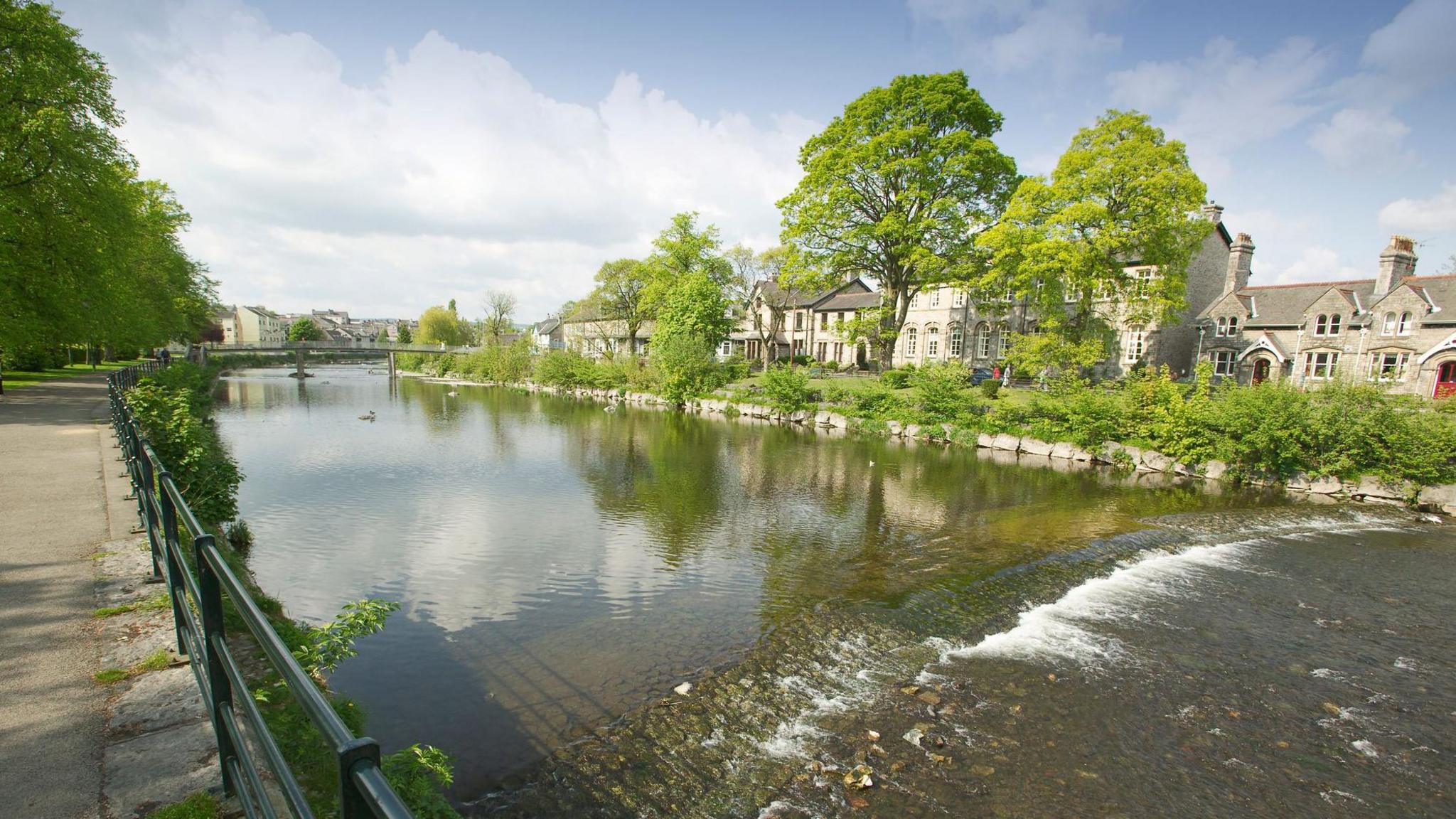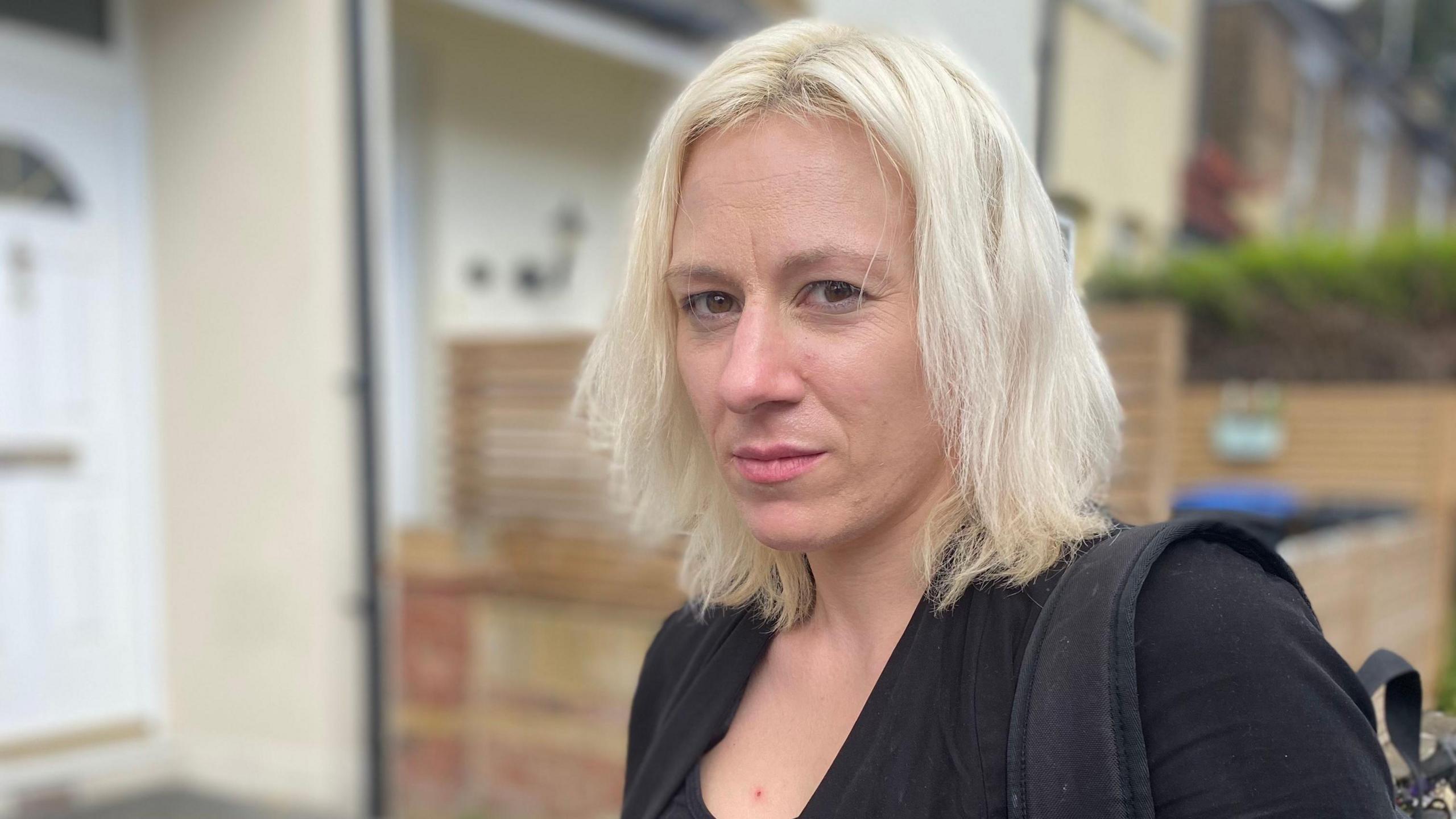Harsh housing reality in holiday home heaven

Ciara Heaton and her two young children found themselves battling the numbers in the hunt for social housing
- Published
Living on the edge of a UNESCO world heritage site may sound like an idyllic place to bring up a family.
But when mother-of-two Ciara Heaton was served with a no-fault eviction notice, she discovered the harsh realities of the housing market in a Cumbrian holiday hotspot.
Having been told she must leave her Kendal home last month, she found "tiny two-bed" social homes were the only properties available to her.
However she struggled to secure even those, on one occasion finding herself 191st on a waiting list.
Ms Heaton was separating from her husband and had asked for her original tenancy to be changed to her name alone.
At that point her letting agent said the landlady no longer wished to rent out the property.
Ms Heaton, and her children aged six and nine, had two months to leave a home they had lived in for six and a half years.
"I was absolutely gutted," she said.
Three jobs, no home
The 38-year-old explained: "I'd been to Citizen's Advice and I'd also worked out that, with the balance of the childcare, me working three days as a teaching assistant, one day as a freelance artist and I do my own painting business as well, I can afford the rent.
"And I would get some help through housing benefit and my husband."
She was served with a section 21 notice, familiar to many as the "no-fault eviction" that has dominated political housing debate for a number of years.
While the current and previous governments have both been vociferous in their opposition to these, many landlords have pointed out they are often needed to regain their properties if their own circumstances or priorities change.
Regardless of the arguments, the eviction notice was just the start of Ms Heaton's perilous journey into a volatile and limited housing market.

Kendal is one of a number of towns in the Lake District popular for tourist lets and second homes
As one of 80 people served with a section 21 in Cumbria in the last 12 months, and because she was at risk of becoming homeless, Ms Heaton was put on the list for social housing.
But she found it seemingly impossible to secure a suitable home.
Across the Westmorland and Furness Council area there are just over 6,100 social houses but, last week, there were only 69 such properties being advertised as available across the whole of Cumbria.
Ms Heaton said more social housing was needed.
"All these new-builds that are four and five-bedroom properties are empty and they're completely unaffordable," she said.
"They might release six as affordable housing [within a development] out of hundreds - it's just hard."
Her MP, former Lib Dem leader Tim Farron, said it had been "far too long" since government allowed the building of "what we used to call council houses" - affordable homes in which to put down roots and raise children.
"The local council here has built a lot of social houses," he said, "but almost for every one the council here builds you see others going out through the back door into Airbnbs."
A Ministry of Housing, Communities and Local Government spokesman said the government has pledged to boost housing supply, "including the biggest increase in social homes in a generation".
But while the foundations for future social housing are still to be laid, the issue of landlord and tenant rights continues to dominate the debate.

The beauty and tranquillity of the Lake District make it a popular spot for holidaymakers
The previous government did not fulfil its pledge to ditch no-fault evictions, something the new government also said it wants to do.
A Labour spokesman said there was a plan to abolish these "immediately" through the Renters' Rights Bill, but there remains a fear new rules could reduce the wider supply of housing.
Helen Westwell from Mint Homes, the agency that managed Ms Heaton's tenancy, said some landlords were deciding to stop letting.
The owner of Ms Heaton's home had a change of circumstances and no longer wished to rent out the property, her agent said.
But Ms Westwell claimed some landlords were being driven out of the market by the threat of new legislation coupled with proposed new requirements for the energy efficiency of rented homes.
"We're finding that, if a tenant gives notice, the likelihood of us continuing to let that property is quite slim," she said.
"Landlords decide they don't want us to re-rent it and they sell it."
As a result, the rental market was shrinking, she added.

Private properties on newer developments prove out of reach to a section of renters
Mr Farron agreed the possibility of new regulations to limit powers to evict tenants was leading many landlords to serve eviction notices before the changes took hold.
"It almost feels like the horses have all bolted," he said.
"Nevertheless, scrapping section 21 is a really important step in giving tenants rights and a sense of security.
"Your ability to live in a home that you can afford, that is safe and that is secure, is kind of like your gateway to living a normal peaceful life.
"If you're always worried you might lose the roof over your head, how can you ever have any peace?"
'Really unfair'
Westmorland and Furness Council said it supported people who had been served eviction notices.
A council spokesman said help offered "typically includes private rented advice with some access to funding" and a higher prioritisation for social housing.
But there is no timeframe on securing a home as circumstances are assessed on a case-by-case basis.
Ms Heaton and her children have now managed to find a place to live, but not in the oversubscribed social sector.
She had secured a private rental, but had to take out a loan in order to fulfil a requirement to pay three months' rent in advance.
Preparing to move in an area with no shortage of holiday lets, she said: "I feel like it's really unfair, it's happening to a lot of people.
"Especially being on the edge of the Lake District where you've got so many Airbnbs and short-term rentals."
Follow BBC Cumbria on X (formerly Twitter), external, Facebook, external and Instagram, external. Send your story ideas to northeastandcumbria@bbc.co.uk.
- Published17 May 2024

- Published15 August 2024
